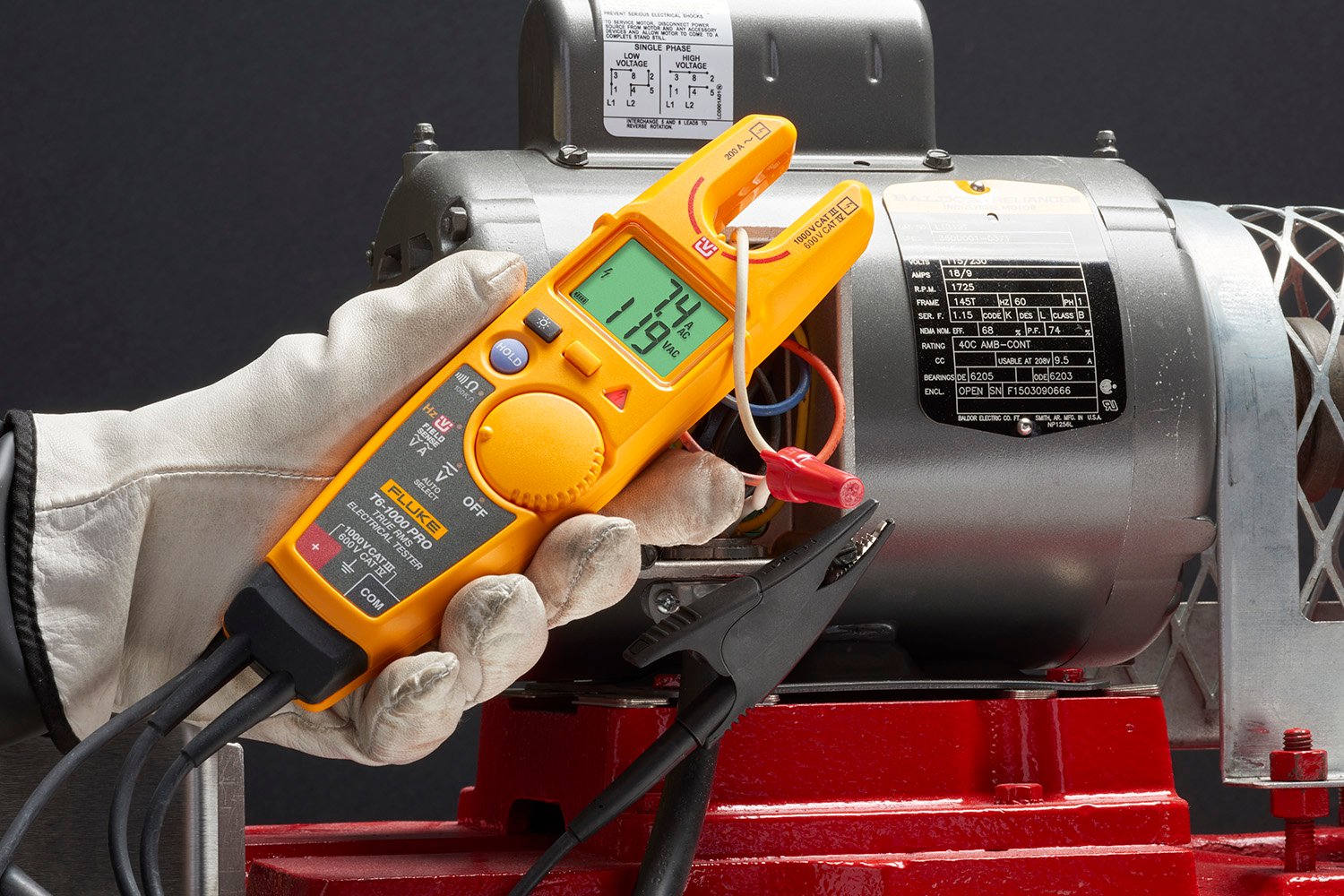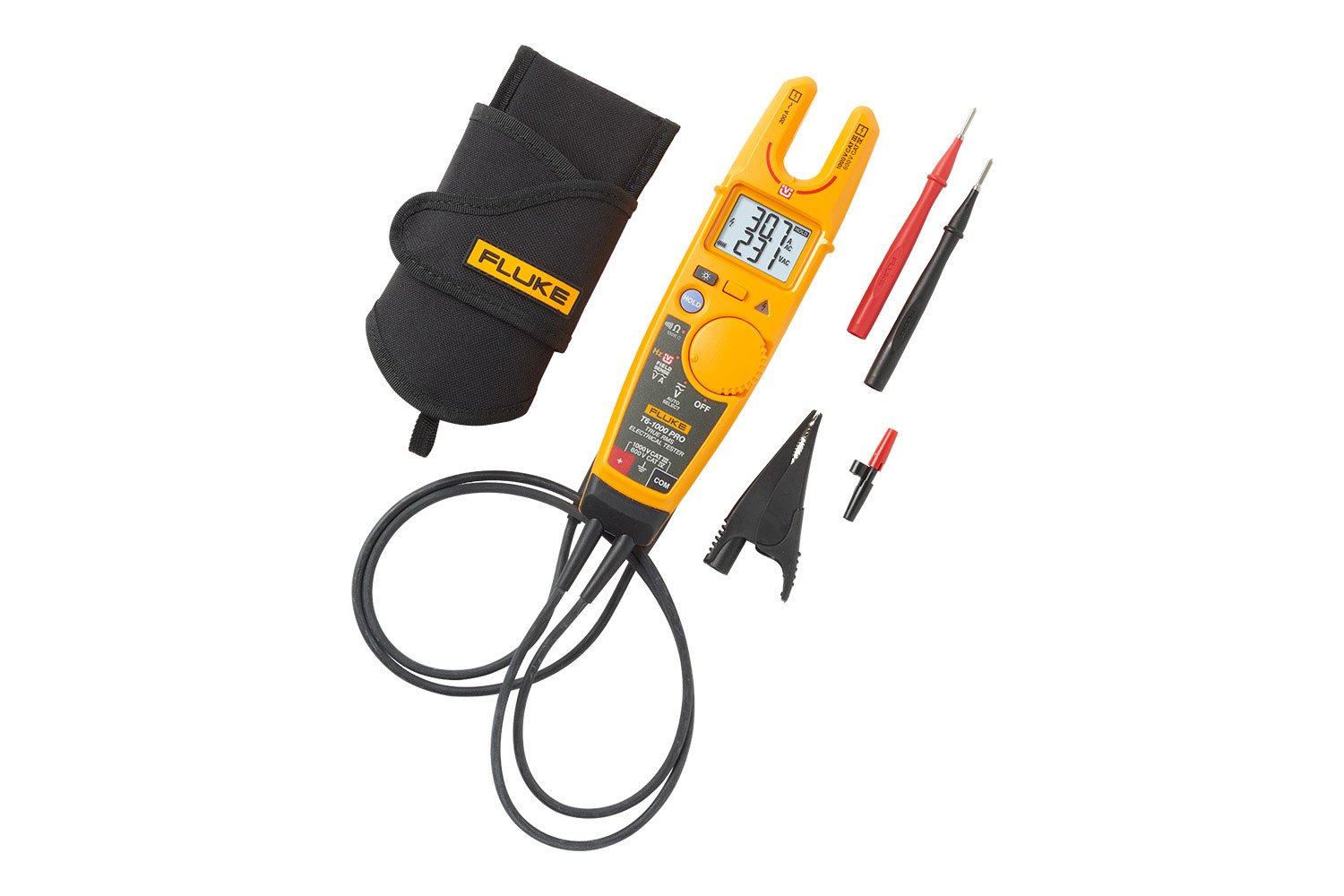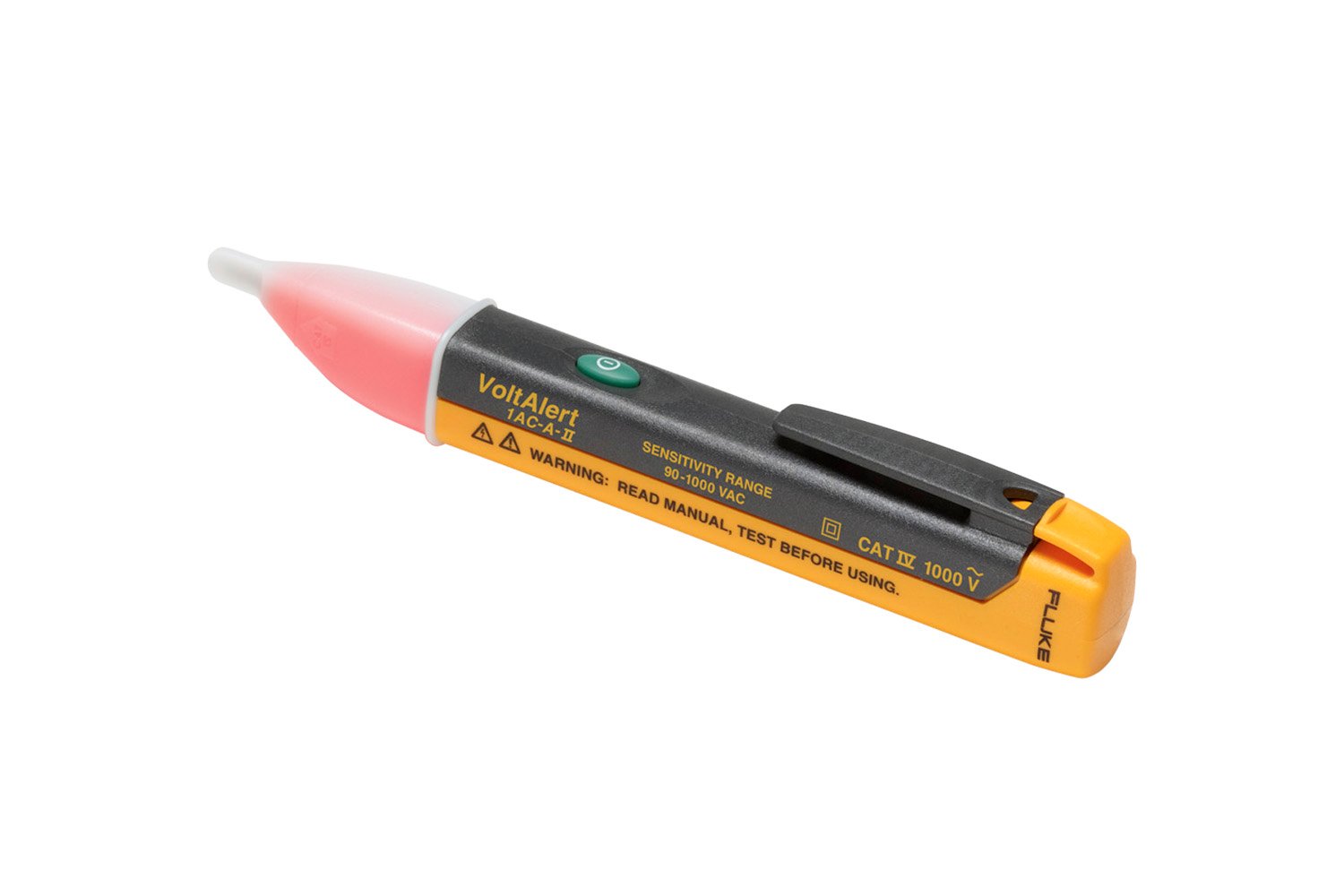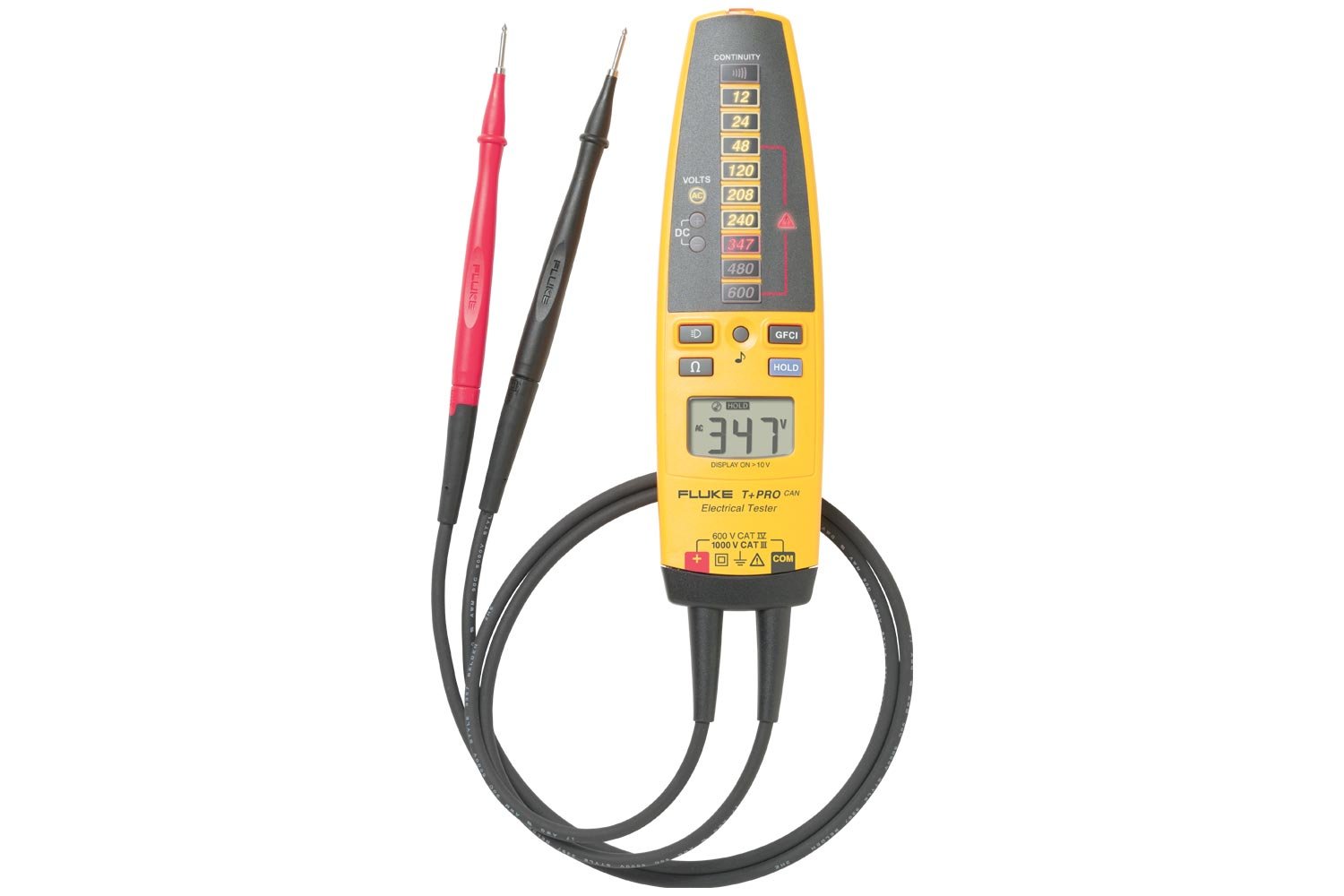Electrical testers, voltage testers, and circuit testers

Fluke offers a diverse range of basic testers, including voltage testers, volt testers, circuit testers, and electrical testers. These versatile tools are suitable for various environments, featuring non-contact voltage detectors, continuity detectors, open-jaw current testers, and open fork testers with FieldSense® technology for leadless measurements. Known for their accuracy and safety, the range also includes motor phase rotation testers, fluorescent light testers, and advanced voltage meters, safer than conventional solenoid testers.
Find the right electrical tester for your needs
Quickly test for presence of voltage, how much, as well as what current a wire is carrying. You need those answers when troubleshooting electricity.
Fluke ST240+ RCD Socket Tester with Beeper
The Fluke ST240+ RCD Socket Tester with Beeper checks that each wire in the outlet is properly...
Fluke T6-1000 PRO Electrical Tester
T6-1000 PRO true-rms electrical tester with ground clip and belt holster
Fluke T5-1000 Voltage, Continuity and Current Tester
Measure up to 1000 V AC or DC without breaking the circuit
Fluke 9040 Phase Rotation Indicator
The Fluke 9040 is effective for measuring phase rotation in all areas where three phase supplies are...
Fluke 1AC II Non-Contact Voltage Tester
A faster way to test for energized circuits. 90 V to 1000 V AC or 200 V to 1000 V AC. CAT IV 1000 V...
Fluke 9062 Motor and Phase Rotation Indicator
The unique Fluke 9062 provides rotary field and motor rotation indication with the benefits of...
Fluke LVD2 Non-Contact Voltage Tester
LVD2 volt light offered by Fluke is a non contact voltage detector that is suitable for commercial...
Fluke T5-1000 Electrical Tester Kit with Holster and 1AC II Voltage Tester
Fluke T5-1000 Voltage, Continuity and Current Tester and 1AC II Non-Contact Voltage Tester
Fluke T5-600/62MAX+/1AC II IR Thermometer, Electrical Tester and Voltage Detector Kit
Fluke T5-600/62MAX+/1AC II IR Thermometer, Electrical Tester and Voltage Detector Kit
Fluke TL80A Basic Electronic Test Lead Kit
Test leads are an integral part of the complete measurement system and extend the capabilities of...
What is the function of a voltage tester?
A voltage tester, sometimes known as an electrical tester or volt tester, is a device specifically designed to detect the presence of electrical voltage in equipment or circuits. It's a critical tool for electricians and DIY enthusiasts to ensure safety before performing electrical work. Voltage testers come in various forms, such as non-contact voltage testers, which allow for voltage detection without direct contact with the conductor, and pen-style testers, which are convenient for quick checks. They are straightforward to use – bringing the tester close to a wire or terminal can indicate whether there is live voltage. Voltage testers are indispensable in confirming that circuits are de-energized before beginning any repair or installation work, making them a fundamental safety tool in any electrical toolkit.
Do I need a multimeter or voltage tester?
The choice between a multimeter and a voltage tester depends on your needs. A voltage tester is adequate if your primary requirement is to detect the presence or absence of voltage in a circuit. These testers are simple, inexpensive, and can tell if a circuit is energized. However, a multimeter is more appropriate for more detailed electrical diagnostics, like measuring current, resistance, continuity, and specific voltage levels. Multimeters, especially digital ones, offer a broader range of functions and can provide detailed information about the electrical properties of a circuit. They are essential for troubleshooting complex electrical issues in various devices and systems.
What is the difference between a volt tester and a voltage tester?
There is no difference between volt and voltage tester; these terms are often used interchangeably. Both refer to a tool designed to detect the presence of electrical voltage in a circuit or piece of equipment. Whether termed a volt or a voltage tester, the primary function remains the same – to safely identify live circuits and help in electrical troubleshooting.
What is the best tool to check for electricity?
A voltage tester is the best tool for checking the presence of electricity in a circuit. Voltage testers are specifically designed for this purpose and offer a quick, safe, and straightforward way to determine whether a circuit is energized. These testers are available in various forms, including non-contact models that detect voltage without direct contact with the conductor. A digital multimeter would be the tool for more comprehensive electrical testing beyond seeing live circuits, as it can measure voltage and other electrical parameters like current and resistance.
What tester do you use to see if electricity is on?
The most appropriate tool to use is a voltage tester to determine if electricity is on in a circuit. This tool is specifically designed to detect the presence of electrical voltage. Voltage testers come in different types, including contact and non-contact models. The contact type requires physical contact with the conductor. In contrast, the non-contact type can detect voltage through insulation or at a short distance, making it a safer and more convenient option in many scenarios.
What does a circuit tester do?
In some contexts, a circuit tester, also known as a continuity tester, checks various aspects of an electrical circuit. Its primary function is to ascertain whether a circuit is complete (has continuity) and whether electricity can flow through it unimpeded. Circuit testers indicate whether a circuit is open (broken) or closed (total). They are essential for checking the integrity of wiring, switches, and other electrical components. Some circuit testers can also test for voltage, making them versatile tools in electrical diagnostics.
Is it a continuity tester or a circuit tester?
A continuity tester and a circuit tester, while similar, serve slightly different purposes. A continuity tester is specifically designed to check if there is a continuous path for electricity to flow in a circuit, indicating whether the circuit is complete or broken. It is beneficial for preventing things like fuses, wires, and electrical connections. On the other hand, a circuit tester can refer to a broader range of testing tools, including those that check for the presence of voltage, the integrity of the circuit, and sometimes continuity. Both are essential tools in electrical work but are used for slightly different diagnostic purposes.
Can you use a voltage tester to test for DC voltage?
Some voltage testers are designed to test AC and DC voltage, but not all can. It's essential to check the specifications of your voltage tester to ensure it can try for the type of voltage you are dealing with. To test DC voltage, ensure your tester is rated for DC measurements, especially if working with automotive, battery-powered, or other DC systems.
What is a GFCI tester?
A GFCI (Ground Fault Circuit Interrupter) tester is a specialized tool used to test GFCI devices, designed to protect against electrical shock by breaking the circuit when a fault current to the ground is detected. A GFCI tester can simulate a ground fault condition, allowing you to check if the GFCI is functioning correctly and tripping as it should.
What is an outlet tester?
An outlet tester is a device used to check the wiring of electrical outlets. It can assess whether an outlet is wired correctly and has proper grounding. This simple tool is plugged into the outlet, and its indicators (usually a series of lights) will display the status of the outlet wiring, helping to identify issues like reverse polarity, open ground, or open hot.
What is a polarity tester?
A polarity tester is a device used to determine the polarity of an electrical connection in a circuit. It checks if the live (hot) and neutral wires are correctly connected, which is crucial for electrical equipment's safety and proper functioning. Incorrect polarity can lead to electrical hazards, making a polarity tester a valuable tool in electrical safety checks.
Can you use a circuit tester to test wires?
Yes, a circuit tester can be used to test wires. It can help determine whether a wire is energized (carrying current) and check the integrity of the wire's connection within a circuit. This is essential in diagnosing electrical faults and ensuring the proper functioning of electrical systems.
Are circuit testers safe?
Circuit testers are generally safe when used correctly and according to the manufacturer's instructions. It's essential to use a tester rated for the specific voltage you are working with and to follow proper safety procedures, such as ensuring the device is in good condition, using insulated handles, and not working on live circuits unless necessary.
What is the need for circuit testing?
Circuit testing is essential for ensuring the safety and functionality of electrical systems. It helps identify faults, verify electrical components' integrity, ensure compliance with electrical codes, and prevent potential hazards like electrical fires or shocks. Regular circuit testing is a critical part of electrical maintenance in both residential and commercial settings.

















